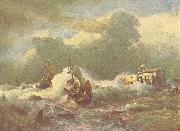Porslinet engros- Olja måleriet Engros- Måleriet Porslinet |
|||||||||||

|
|||||||||||
|
|
|
||||||||||||||
|
Andreas Achenbach
(September 29, 1815 - April 1, 1910) was a German landscape painter. Born at Kassel, he began his art education in 1827 in Desseldorf under Friedrich Wilhelm Schadow at the Desseldorf Academy of Painting. He studied at St Petersburg and travelled in Italy, Holland and Scandinavia.In his early work he followed the pseudo-idealism of the German romantic school, but on removing to Munich in 1835, the stronger influence of Louis Gurlitt turned his talent into new channels, and he became the founder of the German realistic school. Although his landscapes evince too much of his aim at picture-making and lack personal temperament, he is a master of technique, and is historically important as a reformer. The Chambers Biographical Dictionary says of him that "he was regarded as the father of 19th century German landscape painting." A number of his finest works are to be found at the Berlin National Gallery, the New Pinakothek in Munich, and the galleries at Dresden, Darmstadt, Cologne, Desseldorf, Leipzig and Hamburg. He died in Desseldorf. His brother, Oswald Achenbach (1827-1905), was also a painter. |
||||||||||||||
|
|
||||||||||||||
|
||||||||||||||
|
|
||||||||||||||
| Andreas Achenbach
(September 29, 1815 - April 1, 1910) was a German landscape painter. Born at Kassel, he began his art education in 1827 in Desseldorf under Friedrich Wilhelm Schadow at the Desseldorf Academy of Painting. He studied at St Petersburg and travelled in Italy, Holland and Scandinavia.In his early work he followed the pseudo-idealism of the German romantic school, but on removing to Munich in 1835, the stronger influence of Louis Gurlitt turned his talent into new channels, and he became the founder of the German realistic school. Although his landscapes evince too much of his aim at picture-making and lack personal temperament, he is a master of technique, and is historically important as a reformer. The Chambers Biographical Dictionary says of him that "he was regarded as the father of 19th century German landscape painting." A number of his finest works are to be found at the Berlin National Gallery, the New Pinakothek in Munich, and the galleries at Dresden, Darmstadt, Cologne, Desseldorf, Leipzig and Hamburg. He died in Desseldorf. His brother, Oswald Achenbach (1827-1905), was also a painter. 1887 Medium Oil on canvas Dimensions 123 x 224 cm (48.4 x 88.2 in) cyf |
||||||||||||||
|
Related Paintings to Andreas Achenbach :. |
||||||||||||||
|
|
||||||||||||||
|
|
||||||||||||||
|
KOMMA I KONTAKT MED Oss |







